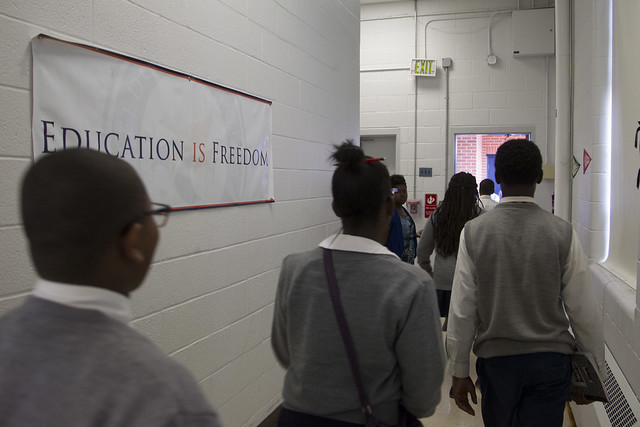
A proposal from Governor Bill Lee to create a statewide appellate Public Charter School Commission to help expand student access to high-quality public charter schools was passed by the General Assembly and is now state law. The commission will assume charter school responsibilities from the Tennessee State Board of Education (SBE). Here SBE Executive Director Sara H. Morrison explains the duties involved and the benefits of a separate commission.
What are some of the high-quality authorizing standards and procedures you have adopted to review a public charter school application?
Back in 2014, the General Assembly passed Public Chapter 850, which made the State Board of Education an appellate authorizer of charter schools and required our agency to adopt national authorizing standards. The State Board collaborated with the National Association of Charter School Authorizers, or NACSA, to develop its policies and practices with a focus on maintaining high standards for charter schools while simultaneously upholding school autonomy and protecting student and public interests. To achieve this, we believe public charter schools must begin with a rigorous and thorough review of their application.
When reviewing an application, we begin with sharing a clear and transparent overview of the process with each applicant, so they are aware of the stages, approval criteria, and expectations in the process. We build a highly competent review team of internal and external evaluators with experience in academics, operations, and finance and train them to ensure a consistent, aligned evaluation of applications. In our review of the application, we look for applicants who have demonstrated the competence and capacity to succeed in all aspects of a new school and would provide a high-quality option to students in their selected community. Our goal in every review process is for it to be transparent, rigorous, and fair to all participants.
What percentage of appeals resulted in State Board authorization? What do you know about how well those schools that are authorized under the State Board are serving students?
The State Board can authorize schools through the approval of an appeal in both a new start application and a renewal application. Since 2014, when the State Board implemented national authorizing standards, our agency has become the authorizer in 13% (3 of 22) of the appeals it has received. Presently, the State Board authorizes three charter schools, two of which are in operation and one that will open its doors in August 2019.
We are proud of the progress our schools have made in a short amount of time. Our first authorized school, Bluff City High School, earned a TVAAS 5 in its first year of operation during the 2017-18 school year, and the State Board was named an Exemplary School District by the Tennessee Department of Education. Our second school, KIPP Antioch College Prep Elementary, just completed its first year of operation. While the school hasn’t received an official state evaluation yet, we do know that their students are meeting and exceeding each of their internal reading and math goals. This August we will open KIPP Antioch College Prep Middle and we are excited to continue to see incredible gains made by our students.
From the State Board’s perspective, what are the advantages of establishing a charter commission?
Having a state body that is fully dedicated to making decisions about charter schools is the accepted national best practice. While the State Board has been able to serve this role well the last few years, it is not in the long-term best interest for our policy-making board to also act as an authorizer and LEA of record for its authorized charter schools. While our charter authorization work has been some of the most rewarding work we do, ultimately, adding more schools will test our capacity to do it well, given the other extensive responsibilities we have in making policy decisions across all K-12 and educator preparation work.
The creation of this commission is also important in that it enables the State Board to focus on evaluating the effectiveness of our public charter school authorizers and supporting them to adhere to best practices that boost student outcomes. This work is critical since authorizers determine the schools they want to open, expectations for their success, and what happens if they fail to make good on promises made to the families and communities they serve.
How might the Charter Commission affect student achievement in Tennessee? We believe that the statewide commission will help further our goal as a state of ensuring that every student has access to an excellent education. Students and families have different needs and should have the ability to select from great options that best meet those needs. This commission will be an important part of statewide efforts to ensure charter schools in Tennessee are adding to the high-quality school options available to families. The State Board stands ready to assist the commission by sharing experiences, best practices and lessons learned in this space, in order to best serve Tennessee’s children, parents, and families.
Dr. Sara H. Morrison is executive director of the Tennessee State Board of Education.
